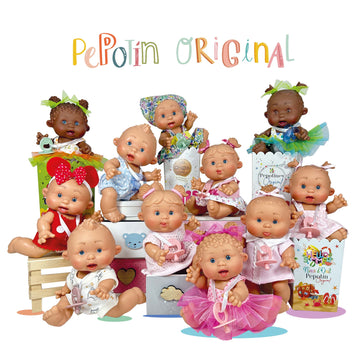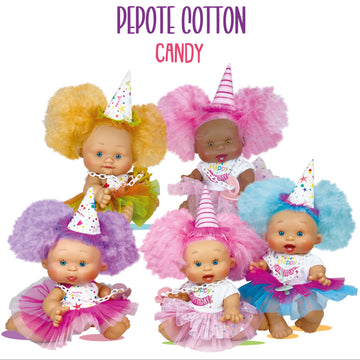5 Easy Facts About Dolls And Accessories Described
5 Easy Facts About Dolls And Accessories Described
Blog Article
The Single Strategy To Use For Dolls And Accessories
Table of ContentsThe Definitive Guide to Dolls And AccessoriesNot known Details About Dolls And Accessories The Only Guide to Dolls And AccessoriesWhat Does Dolls And Accessories Mean?The Best Guide To Dolls And AccessoriesSome Ideas on Dolls And Accessories You Should KnowThe Buzz on Dolls And Accessories
When dolls are included in team play, youngsters practice waiting, sharing, and paying attention to others' concepts. Whether they're claiming to be a moms and dad, sibling, or close friend, youngsters discover just how partnerships workhow to support others, solve disagreements, and look after somebody else. These early role-play experiences come to be the foundation for healthy relationships and relationships later on in life.Repeating calming regimens with a doll (feeding, shaking, putting to bed) can help kids really feel tranquil and protected. Taking care of a doll can make a youngster really feel qualified and confident.
Dolls And Accessories for Dummies
When youngsters see dolls that show their race, heritage, and culture, it strengthens a positive feeling of identity. Dolls additionally present kids to societies outside their very own, building respectful interest and empathy for others.
As Dr. Karyn Purvis, a leader in child advancement and trauma-informed treatment, as soon as claimed: This effective quote highlights exactly how play isn't just funit's exactly how youngsters find out ideal. The mind cables itself via rep. When a kid is engaged, joyful, and mentally attached to an activitylike doll playthe brain strengthens those connections faster and extra meaningfully.
What Does Dolls And Accessories Do?

Boys require compassion, compassion, and creative imagination tooand doll play uses that. Dolls are frequently a youngster's very first "buddy," helping them practice relationships, construct communication skills, and really feel comforted.
Things about Dolls And Accessories
Through dolls that matter. Samantha Ong Samantha Ong is the owner of Joeydolls, a Canadian-based toy brand name on a goal to celebrate Eastern societies with joyful, comprehensive play. Influenced by her very own experiences growing up without cultural representation, Samantha creates dolls that aid kids feel happy of that they are while triggering curiosity and compassion in others.
Playing with dolls urges youngsters to chat even more regarding others' thoughts and feelings, a research has found. The research suggests that playing imaginary games with dolls can help youngsters develop social abilities, concept of mind and compassion.
Not known Facts About Dolls And Accessories
They were also more probable to address the dolls in the second person, talking to them directly, whereas the characters on the computer system screen they often tended to describe in the third individual. No distinction was observed in between boys and girls."Interior state language can suggest that a youngster is thinking of other individuals's ideas and feelings while having fun with dolls," said Gerson.
And that they see language usage in this respect is great confirmation of the theory."Mardell included that the findings should certainly put on any type of sort of role-play plaything, as opposed to specifying to Barbies. "I would certainly take a more comprehensive sight of what a doll is," he said." [It might be] any item that the kid can spend a sense of various other into a stuffed pet, an oven glove that talks to them, or perhaps a fictional close friend."Kid typically start to show indications of inner state language around the age of four.
Dolls And Accessories Fundamentals Explained
"It ends up being crucial for making and maintaining friendships, and exactly how they find out from their educators, and moms and dads."The study also discovered that the youngsters had raised mind activity in the posterior premium temporal sulcus (pSTS) region when they spoke as though their dolls had thoughts and feelings. The pSTS region is believed to be included in the advancement of social and psychological handling abilities.
Youth is not a static life phase; without a doubt, the interpretation, significance and understanding of childhood years are all subject to modification. By the 19th century one of one of the most profound modifications was the significance placed on allowing children to experience "the carefree happiness" of childhood years through playtime activities. Play was currently thought about to be an essential component of an excellent childhood.
In order to fully understand the definition of play, one must also recognize the value of the doll. Dolls are much more than toys created to amuse young women. During the 19th century appropriate play tasks were picked to promote intellectual, physical or emotional development. Dolls were particularly preferred since they were thought to promote and support womanly high qualities such as kindness, caring and compassion.
The Best Guide To Dolls And Accessories

It is only with archaeological investigations that scientists can wish to discover and document the full variety of play experiences. Narrating these experiences, click for info and specifically the duty of dolls, is vital for presenting a much more complete photo of childhood years throughout the nineteenth century. Alarcn, Sara E - baby dolls., "Kid's Play: The Duty of Dolls in 19th Century Childhood" (2007 )
Report this page